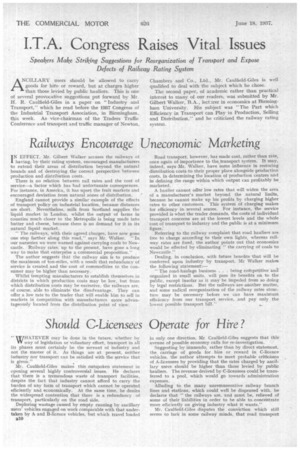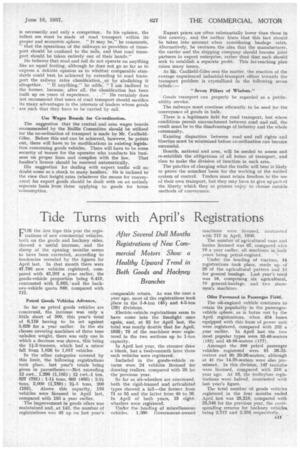Should C-Licensees Operate for Hire?
Page 44

Page 45

If you've noticed an error in this article please click here to report it so we can fix it.
" WHATEVER may he done in the future, whether by way of legislation or voluntary effort, transport in all its phases must certainly be the servant of industry and not the master of it. As things are at present, neither industry nor transport can be satisfied with the service that is given."
Mr. Caulfield-Giles makes this outspoken statement in opening several highly controversial issues. He declares that there is a tremendous waste of transport facilities, despite the fact that industry cannot afford to carry the burden of any form of transport which cannot be operated efficiently and economically. At the same time, he denies the widespread contention that there is a redundancy of transport, particularly on the road side.
Deploring wastage caused by empty running by ancillary users' vehicles engaged on work comparable with that undertaken by A and B-licence vehicles, hut which travel loaded
in only one direction, Mr. Caulfield-Giles suggests that this avenue of possible economy calls for re-investigation.
Suggesting by innuendo, rather than by direct statement, the carriage of goods for hire or reward in C.-licence vehicles, the author attempts to meet probable criticisms of A-licensees by providing that the rates charged by a.ncillary users should be higher than those levied by public -hauliers. The revenue derived by C-licensees could be transferred to a pooI, which would go towards administration expenses.
Alluding to the many unrernunerative railway branch lines and stations, which could well be dispensed with, he declares that " the railways are, and must be, relieved of some of their liabilities in order to be able to concentrate more efficiently on giving industry what it wants."
Mr. Caulfield-Giles disputes the conviction which still seems to lurk in some railway minds, that road transport
is necessarily and only a competitor. In his opinion, the fullest use must be made of road transport within its proper and economic sphere. "It may be," he comments, " that the operations of the railways as providers of transport should be confined to the rails, and that road transport should be taken entirely out of their hands."
He believes that road and rail do not operate on anything like an equal footing, although he does not go so far as to express a definite opinion as to whether comparable standards could best be achieved by extending to road transport the railway rates classification, _or by abolishing it altogether. " If anything," he adds, " I am inclined to the former, because, after all, the classification has been built up on years of experience......Be certainly does not recommend that users of road transport should sacrifice its many advantages in the interests of traders whose goods are such that they have to be carried by rail.
Use Wages Boards for Co-ordination.
The suggestion that the central and area wages boards recommended by the Bailie Committee should be utilized for the co-ordination of transport is made by Mr. CaulfieldGiles. Before this end can be achieved, however, he points out, there will have to be modifications in existing legislation concerning goods vehicles. There will have to be some security of tenure for the operator who conducts his business on proper lines and complies with the law. That haulier's licence should be renewed automatically.
His suggestion for dealing with export traffic will no doubt come as a shock to many hauliers. He is inclined to the view that freight rates (whatever the means for conveyance) for export goods should be dealt with on an entirely separate basis from those applying to goods for home consumption. Export prices are often substantially lower than those in this country, and the author hints that this fact should be taken into account when considering haulage rates. Alternatively, he ventures the idea that the manufacturer, the carrier and the shipping company should become joint partners in export enterprise, rather than that each should seek to establish a separate profit. This far-reaching plan raises many issues.
As Mr. Caulfield-Giles sees the matter, the reaction of the average experienced industrial-transport officer towards the transport problem is crystallized in the following seven beliefs:—
" Seven Pillars of Wisdom."
Goods transport can properly be regarded as a publicutility service.
The railways must continue efficiently to be used for the conveyance of goods in bulk.
There is a legitimate field for road transport, but where conditions permit encroachment between road and rail, the result must be to the disadvantage of industry and the whole community.
Existing disparities between road and rail rights and liberties must be minimized before co-ordination can become successful.
Boards, national and area, will be needed to assess and re-establish the obligations of all forms of transport, and then to make the division of functiOn in each area.
The practice of charging what the traffic will bear is likely to prove the soundest basis for the working of the unified system of control. Traders must retain freedom in the use of their own transport, but they may have to give up part of the liberty which they at present enjoy to choose outside methods of conveyance.




























































































